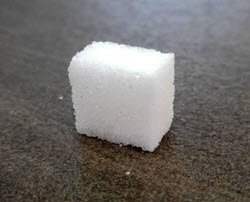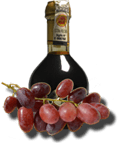 A good 95% of all industrial balsamic vinegars are refined with sugar, sucrose, dextrose, glucose, fructose syrup, starch syrup, caramel syrup, lactose, maltose, malt extract, maltodextrin, dextrin or wheat dextrin, sweet whey powder, barley malt extract or other acidic additives in the flavor, or with concentrates of an unripe balsamic vinegar.
A good 95% of all industrial balsamic vinegars are refined with sugar, sucrose, dextrose, glucose, fructose syrup, starch syrup, caramel syrup, lactose, maltose, malt extract, maltodextrin, dextrin or wheat dextrin, sweet whey powder, barley malt extract or other acidic additives in the flavor, or with concentrates of an unripe balsamic vinegar.
In the classic balsamic cream , sugar or sugar additives are indispensable, as these substances make the cream a sweet, syrupy cream. A real calorie bomb - a topping no worse than any other topping that you drizzle on the ice cream or cake.
However, if you are looking for a balsamic vinegar without artificial added sugar, then you are looking for the 5% of balsamic vinegar that can dispense with the addition of sugar due to its manufacturing process.
First of all: Balsamic vinegar is a luxury item, a kind of dressing to refine dishes. Sugar plays a central role in the manufacturing process of a balsamic vinegar. The Trebbiano grape, which is mainly used for production, is a particularly sweet grape and is harvested particularly late, so that the sugar content of the grape is between 16-18%. When preparing the cottura, the cooking of the pressed grapes, the vinegar winemaker takes great care that the sugar from the grapes does not caramelize, as this would negatively affect the taste. The ready-cooked must from the grapes, from which the balsamic vinegaris supposed to have a natural sugar content of up to 33%. In comparison, an average grape juice has approx. 160g of its own fruit sugar per liter - which corresponds to approx. 20% with the density of grape juice.
This means that 100kg of cooked grape must contain up to 33kg of sugar! Because the sugar is the basis for the vinegar bacteria and alcohol yeast. The yeasts convert the sugar into alcohol and the vinegar bacteria convert the alcohol into vinegar. Sugar is the basis for this process. During the ripening process, the yeast and the bacteria die and release enzymes for the further ripening process. The residual sugar, which is not fermented, makes up the sweet part of the balsamic vinegar. A balsamic vinegar without natural sugar is not a balsamic vinegar. Very old balsamic vinegars, we are talking about 40 years or more, can also form glucose lumps - which does not reduce the quality. These glucose lumps are formed from tiny peel residues or foreign substances that were not filtered during the must production.
In summary: A good balsamic vinegar does not have any added sugar. However, the sugar content of the grapes , which are the basis of the balsamic vinegar, can not be removed in a real balsamic vinegar , because the sweetness of the balsamic vinegar comes from the natural sugar content. Make sure that you buy a balsamic vinegar without sweetening additives.
If you want to be on the safe side that you want to buy a balsamic vinegar with no added sugar, then buy an Aceto Balsamico Tradizionale. If you want to buy a balsamic vinegar without sugar, i.e. also without the natural fructose of Italian grapes, then I would advise you not to use balsamic vinegar, but to forego this stimulant altogether.
Further information:













Aceto Balsamico Tradizionale
Matilde Piccinini, 136 pages
EUR (IT) 35,00
order now